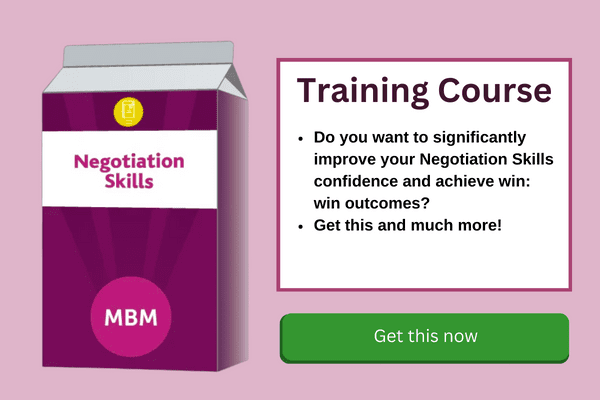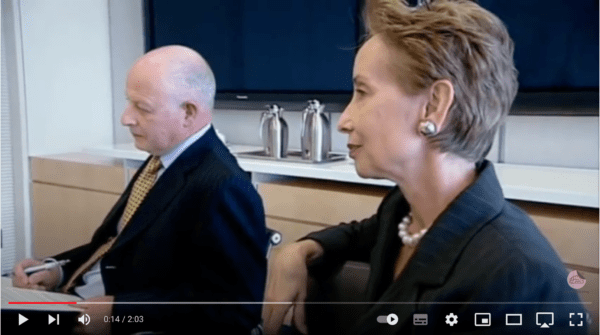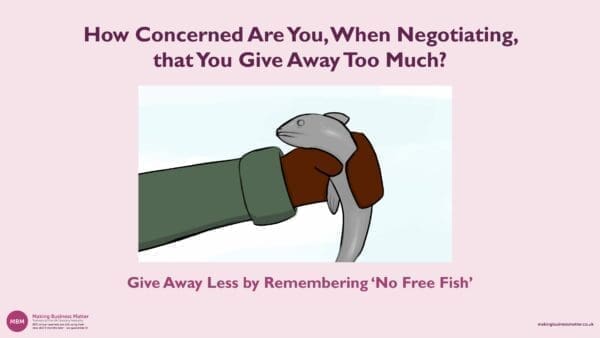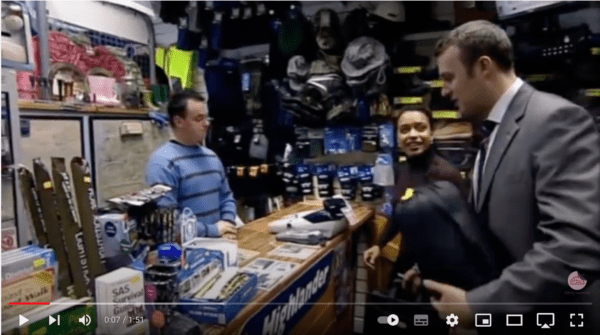BBC’s The Apprentice Can Provide Us With Many Good and Bad Negotiation Skills Examples
In the two clips below, we’ll see good negotiation skills examples and bad negotiation skills examples. I recommend clicking on the video, which will open in a new tab so that you can switch between our descriptions of the bad examples, as you watch them play out.

Bad Negotiation Skills Examples
In this 2-minute clip, we watch the young Apprentice (Phillip) negotiating the price per head of a finger buffet that he wishes to supply to the older man and woman opposite. He doesn’t do well, and here are our observations of exactly what he doesn’t do well.
Example #1 at 3s:
Phillip is waiting for his colleague to ready himself, yet Phillip is the lead negotiator and you’d expect him to be confident and to lead the way, right from the start. As Stephen Covey suggests in habit 2, ‘Begin with the End in Mind’. Watching Phillip’s body language, I believe he had decided that he was going to lose even before he entered the building, and this was because he had not prepared his negotiation.
Example #2 at 10s:

‘…around sixty-five pounds per head.’ This is soft language that gave away his position. Using the word ‘around £65’ could be picked up by the opposition as less than £65. Delete all soft language from your negotiation talk.
Sticky Learning ® is 7 times more effective than 1-day training courses. Plus, you will get a Chain of Evidence proving your Return on Investment. Discover soft skills training that changes behaviours long term.

Example #3 at 20s:
‘I don’t know how it sounds to you’. Of course, he doesn’t know. An open question would be better here, like ‘How does this sound to you?’. A great negotiator would know whether the opposition is a visual, auditory or kinaesthetic person and use the appropriate word. For example, ‘How does it sound to you?’, would be used for auditory people. ‘How do you see that working?’ for visual people, and ‘How does that feel?’ for kinaesthetic (feeling) people.
Example #4 at 30s:
The first proposal was not credible. Proposals need to be ambitious and also credible. Plus, Phillip uses the word ‘around’ again.
Example #5 at 31s:
The body language of the other two members of Phillip’s team shows a lack of a unified approach. They are both leaning away from Phillip which indicates to the opposing party that this team is not unified. Plus, the guy to the far left’s body language is signalling apprehension, fear and nervousness. Whilst the guy in the middle is looking worried and concerned. An effective negotiator might drive a wedge between the team.
Example #6 at 33s:
Phillip is hurriedly making calculations which means he is not prepared and further demonstrates a lack of credibility, which is a key part of the trust model.
Example #7 at 39s:
‘Let’s get realistic’. This is very poor language because by using these words it strongly suggests that up until this point he has not been realistic. A further attack on his own credibility and by himself, which is strange.
Example #8 at 40s:
‘Thirty-five pounds per head’, says Phillip. The problem is that the accompanying tone to this sentence indicates to the other party that he is not confident in this proposal, and they pick up on this and say ‘No’. Plus, Phillip has given away free fish, which means that he is reducing his price every time they say ‘No’, so, why would they stop saying no?

Example #9 at 60s:
‘Incredibly realistic’ – was it not before?!
Example #10 at 72s:
‘…very difficult to stack up at anything lower than…’. Again, this is soft language because the opposing party could have heard this as an indication to ask for a lower price. This is because when people say ‘very difficult’ they aren’t saying ‘impossible’.
Summarising Phillip’s Biggest Mistake
Credibility. Phillip lost credibility because his opening proposal was too high and then further eroded his credibility by continually reducing the price and getting nothing back from the other party. Conditional concessions – give to get – you must get something in return when you give something away.
Good Negotiation Skills Examples

This 2-minute clip shows us Mona and James selling and negotiating a new type of sleeping bag to a high street shop. Mona demonstrates some excellent examples of how to negotiate effectively. Let’s take a look…
Example #1 at 8s:
‘Nice shop’. Mona opens with a compliment, which Dale Carnegie reminds us to do in his famous book, ‘How to win friends and influence people‘.
Example #2 at 23s:
James enables the buyer to hold, touch and feel the product, rather than just Mona & James talking at the shopkeeper. Particulate;y if the shopkeeper is a kinaesthetic person, this will be invaluable as those people want to touch the product.
Example #3 at 24s:
Mona and James share 3 attributes of the product and pause. Less is more. Rather than keep talking to the shopkeeper to force the sale, they say a few things and stop. Remember, people don’t want to be sold to, but they do want to buy.
Example #4 at 27s:
The shopkeeper says, ‘I wouldn’t give you a massive order’. A good negotiator picks up on this giveaway word, and knows that ‘massive’ demonstrates an interest in a larger order.
Example #5 at 31s:
Mona asks an effective open question of ‘What quantity were you thinking?’, and adds on ‘I have a minimum order’ to manage his expectations that the order needs to be large.

Example #6 at 34s:
When Mona shares ’24 pieces’ her tone is confident, and not wincing as though it could be too much.
Example #7 at 43s:
The shopkeeper gives away his position with ‘…price down a little bit more’. This indicates that he wants a gesture and if he has that he will order. Mona responds to his request with a similar request and accompanies it with a smile to take the potential heat out of the negotiation.
Example #8 at 51s:
‘The least I can go down to is £48. That is rock bottom’. Very definitive language from Mona.
Example #9 at 55s:
Mona and the shopkeeper then haggle about the volume. Haggling is not negotiating but is still a valid form of resolving a conflict.
Example #10 at 73s:
A good summary of the agreed deal from Mona. Many negotiations fall apart because the summary is often sent in an email after the meeting, and then both parties realise that they agreed on something different. Summarising in the meeting is essential to ensure that what both parties think was agreed, was agreed.
Summarising Mona’s Biggest Achievement
Approach. A conflict is said to be 95% tone and 5% the issue. Mona worked the opposite way by complimenting him at the start, being friendly, not talking too much, smiling, and listening. Building rapport is one of the qualities of an effective negotiator. By arriving at common ground, through rapport, the research concludes that more win:win deals are achieved.
Action: For even more useful content on negotiations, check out our ultimate guide on negotiation skills.




